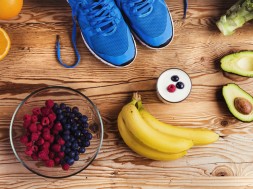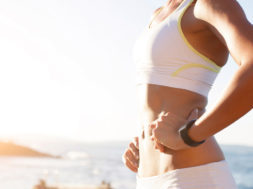Small lifestyle changes can have a significant impact on your long term health and fitness. It doesn’t have to be hard! What can you do?
Eat breakfast everyday: Do you skip breakfast and by mid-morning and find yourself reaching for a coffee/tea, biscuit and/or chocolate bar? Your body is crying out for energy in the form of blood glucose to fuel your brain. Breakfast is THE most important meal of the day.
Here are some quick easy ideas to help you on your way.
- Have a bowl of unprocessed whole-grain cereal (e.g. Oats or muesli) with low-fat milk and fruit.
- Most offices have refrigeration facilitates, take advantage of this and keep some wholegrain or fruit bread, English muffins, etc. at work for toasting along with one of your favourite spreads like low-fat cheese, baked beans, etc.
- Keep a tin of canned fruit on hand and have that with low-fat yoghurt.
- Make up a low-fat smoothie with a banana, low-fat milk, low-fat yoghurt and a dash of honey.
Kick off your day in this manner and you’ll be amazed how much better you’ll feel.
Fruit and Vegetable:
“Eat the rainbow”. The more colour you have in your diet the better. Fresh fruit and vegetables are crucial additions to your diet. The current recommendation is “2 and 5” – two serves of fruit and five of veggies.
How can we achieve this?
- Have a piece of fruit with your breakfast as well as for a snack during the day.
- Have a salad roll and some lean protein for lunch or vegetable soup.
- For dinner have a stir-fry where the vegetables hold centre stage with small quantities of lean meat complimenting (rather than dominating) the dish.
Drink more water. If we simply replaced all other beverages and drinks in our diet with water we’d all lose weight! Imagine, each time you reached for a soft drink, fruit juice, alcoholic drink, energy drink, coffee or tea you had a glass of water instead. You’d immediately shed unwanted body fat. Water has no calories and it is crucial for daily function. Most people don’t drink anywhere near as much water as they require during the day. If you wait until you feel thirsty you’re already partially dehydrated!
Working in air-conditioned environments, drinking certain beverages such as coffee, energy drinks and alcohol actually increases fluid losses. Your best bet is to have a water bottle on your desk and sip on it at regular intervals throughout the day. This should have you running to the toilet at regular intervals throughout the day and passing clear and copious volumes of urine – that’s good for you!
Trim the fat. Aim to lower the amount of fat in your diet, particularly saturated fat and particularly if you’re trying to lose weight.
Fats per gram provide more than twice the energy concentration of either protein or carbohydrate so volume wise you can eat considerably more if your food choices are lower in fat. It’s relatively easy to lower your fat consumption. Here’s some tips:
- Buy lean cuts of meats at the supermarket or have your butcher trim the meat of excess fat.
- Look for leaner cuts of meat. White streaks through red meat suggests a greater fat content or “marbling”.
- Remove the skin from chicken before cooking it.
- Use low-fat cooking methods like spraying a non-stick pan with an olive oil spray, grill, steam or BBQ your food.
- Read labels and choose lower fat alternatives (e.g. Low fat milk, cheese, yoghurt compared to the higher fat alternatives).
- Lower your consumption processed foods and takeaways – these are notoriously high in fat.
Five smaller meals throughout the day rather than three big ones. Eating smaller regular meals throughout the day will help to raise your resting metabolic rate and keep the energy expenditure ticking over at a higher rate. Enjoy healthy snacking throughout the day. Snack on fruit and vegetable sticks, dry biscuits topped with vegemite, low-fat cheese and tomato. Your options are only limited by your imagination.
Move! Probably the single biggest thing you can do to help improve your health and fitness is get active. Remember, exercise doesn’t have to hurt to be good for you. Simply walking at a moderate intensity – 100 steps in a minute is quick enough – for 30 minutes at a time on most days of the week is adequate to improve your cardiovascular function and body fat levels if you’ve been sedentary for a while. As your health and fitness adapts to this level of activity you can go further and harder. Huffing and puffing to the point where you break into a sweat 2-3 times per week will improve your heart and lung function.
Stretching and strengthening exercises are also important and should be undertaken 4-5 times and 2-3 times per week respectively. If you find it hard to walk by yourself do it with a friend. If walking bores you look for other exercise options, join a gym, take up a team sport, cycle or swim. It really doesn’t matter – your heart doesn’t know what’s making it beat, just use it!
For more information or to start your own exercise and food program, please visit our website at [http://www.guyleechfitness.com].
Guy Leech Fitness is an innovative world first personalised, interactive, multimedia health and fitness platform.
Our team of highly qualified and experienced allied health professionals will help to fully personalise a 12 week (on-going) diet and exercise program which is tailored to YOUR specific requirements based on your current fitness level and nutritional requirements.
You don’t have access to a gym, you hate walking or you’re a vegetarian – no problem!
The responses to your online questionnaire enable our exercise physiologists and dietitians to tweak your 12 week program to cater for these (and many more) personal requirements you may have.
Delivered over the internet, Guy Leech Fitness promises to keep you on task, motivated and directional in your ongoing quest to improve your long term health and fitness.
The key to improved health and fitness through dietary modification and exercise intervention is CONSISTENCY over time.
Our programs aren’t designed as “diets” per se.
A “diet” suggests something you go “on” and come “off”. Our dietary guidelines are designed to teach you how to eat appropriately in the long term to achieve and sustain a healthy weight based on internationally recognized best practice nutritional guidelines.





